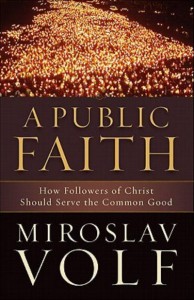 Miroslav Volf, A Public Faith: How Followers of Christ Should Serve the Common Good (Grand Rapids: Brazos Press, 2011). 175 pp.
Miroslav Volf, A Public Faith: How Followers of Christ Should Serve the Common Good (Grand Rapids: Brazos Press, 2011). 175 pp.
The first election in which I voted was in 1980. The nation was suffering from what President Carter called a “malaise.” Many of the political class were suggesting that the nation’s troubles were so many and so deep that the office of the President was no longer useful. The Moral Majority was exercising its political muscle and its leaders were calling for “moral leadership.” Ronald Reagan was larger than life. He embraced the religious right and the religious right embraced him. I voted for Reagan in 1980, and again in 1984. I don’t regret it.

